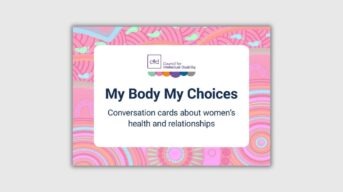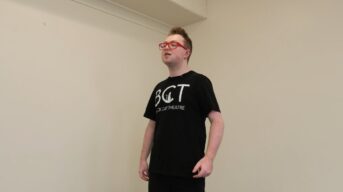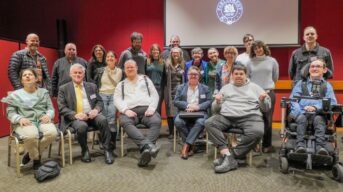Ben’s Story: Working at City of Ryde Council
Ben and Jennie worked together at the City of Ryde Council in Sydney, NSW.
In this video, Ben talks about his job and what he enjoyed most.
Jennie explains how the council has become a more inclusive workplace for people with intellectual disability.
Together, they talk about how the council has made job interviews more accessible, how they provide support at work, and how they use clear and inclusive communication.
Ben also shares his two passions: mental health and disability. He tells us about an event he organised for Mental Health Month, which brought people together to learn and connect.
City of Ryde Council took part in the Inclusion Works project, a program led by CID. Through the project, they received training, resources, and ongoing support to make meaningful change.
This story shows what is possible when leaders commit to inclusion.
Want to make inclusion work in your council? Learn more about Inclusion Works.
Ready to take the next step? Start our free eLearning course and discover how to build a more inclusive workplace for people with intellectual disability.
Transcript
[Music]
Ben: Hi, my name is Ben. I am the Community Development Project Administrator here at City of Ryde Council.
Jennie: Hi, my name is Jennie and I am the Senior Coordinator City Economy at City of Ryde Council.
So there are three parts that we have modified in our recruitment process. Firstly we let the candidates to bring in a family member or support worker if they wish to. Secondly we have translated the job description into Easy Read version. And thirdly we let the candidates to nominate their preferred working dates and time.
Ben: Being able to look at the questions 48 hours in advance which I have never been able to do in any of my interviews in the past made me be able to thrive not just in the interview but also throughout that role as well.
Jennie: I had a chat with all our team members about how we can create a friendly environment and supportive when Ben comes on board. I also encouraged the team to speak in plain language when they speak to Ben. Also allow extra time for Ben to reflect and answer their questions. We also worked with CID to organize 4 training sessions about intellectual disability as well so our staff are ready. On the first day that Ben was working here I also showed Ben around and introduced him to all team members. We also have set some key goals that he wants to achieve before thcile end of his contract as well.
Ben: So I usually get here about 9:00. I will start the day looking through all of the emails that I have.
Ben (at computer): Just go through all of the things that they have sent me.
Ben (voiceover): After that, I will have a meeting to go through all of the tasks that I need to do for that week.
Jennie (in meeting): So the event would start at 5:30 p.m. until 7:30 p.m.
Ben: Okay.
Ben (voiceover): Working out the priority of all of those different things.
Jennie: So for example if he needs to go out to a community event this week or he needs to review a document or when is a deadline. So I just want to communicate it very clearly with Ben.
Ben (in meeting): Needing to get there a bit earlier. Probably setting things up.
Jennie: We also have a chat about how he is doing in general. Whether he needs extra support, extra time to complete the task.
Jennie (in meeting): If I am away you report to Sean or Sue or you can ask any question to any staff available there on the day.
Ben: Okay.
Ben (in voiceover): Having an intellectual disability myself it can be difficult to have really really tight deadlines.
Jennie: I am someone that likes being busy and I like planning ahead. So sometimes it could be overwhelming for Ben and I needed to remind myself to slow down and simplify the information and only share the key information with Ben.
Ben (on phone): Hello Benjamin, City of Ryde.
Ben (voiceover): I am working with the community services team. There are a few different things that I do.
Ben (on phone): I will probably be talking to the volunteers and telling them about all of the events that will be in the next month or so.
Ben (voiceover): Jennie has the program with all of the volunteers.
Ben (on phone): Thanks, Jennie. I’ll see you later. Bye.
Ben (voiceover): I do a lot of the admin with those volunteers to make sure everything runs smoothly. And then if I am out in the community I might be helping with certain events and helping set up and helping to run those events.
Jennie: I also have buddied Ben with different staff as well. So he has got the opportunities to be exposed to different portfolios and have opportunities to work with different people in the team.
Colleague: Ben we’ve got this urban heat survey we’d like you to review for inclusivity. Here is a look at it for you.
Ben: Thank you. Okay so just having a look at that…
Ben (voiceover): Also I give feedback to different other teams. Flyers. Documents. Their websites.
Ben (in meeting): Size of the font is quite small and that might be difficult.
Ben (voiceover): All of the things that they do might be changed from English into simpler English or Easy Read.
Ben (in meeting): Thank you for coming to me and asking for my help. I really appreciate it.
Colleague: Thank you.
Ben (voiceover): One thing that I was a little bit nervous about. I knew that everybody else would have so much more experience than I do. And they would probably be working together as a team for quite some time.
Wayne: Hi Ben.
Ben: Hi Wayne.
Wayne: How are you doing?
Ben: Very well thank you.
Wayne: Good to see you.
Ben: And yourself?
Wayne: Yeah. Yeah, not too bad. What are you working on?
Ben (voiceover): But they have been able to bring me into that team and just want me to work with them. It is just the best thing that I could could have possibly imagined.
Jennie: Employment is very important not only because it provides a dollar at the end of the day but improves people’s wellbeing and making sure that our society is more inclusive.
Ben: For my wellbeing and mental health. It means that I can get out of the house. It gives me purpose and 2 passions that I have disability and also mental health. I have been working with volunteers that all have disabilities. I also did an event for Mental Health Month in October. It was a huge success. I got about 70 people from the community to come along. I got a lot of good feedback from it. A recognition award from the council for it as well.
Jennie: Having a staff with intellectual disability has been a rewarding experience for our council. We have learned so much about being more inclusive at our workplace. Everyone has got a right to work and people should be treated fairly and equally.
Ben: Everybody has been so great to work with. I think that it has been the best reason to come here as well.
Jennie: I would like to encourage all councils in New South Wales but also challenge you to employ people with intellectual disability. If City of Ryde can do it you can also do it.
[Music]
For more information call 1800 424 065 or email employment@cid.org.au.



 1800 424 065
1800 424 065 


















